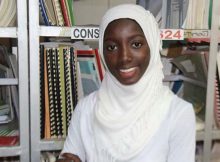She was raised by a single mother after her father passed away when she was still one year old. She eked out her childhood years in great deprivation. It was her mother who stepped up to the plate at great discomfort for her to learn. Yet in the eyes of the people of her community, women are half human.
Now that she’s old and bold enough, Salimatou Fatty is all arms against one of the most important twin challenges of her generation: child neglect and subjugation of women. Read our exclusive interview with her:
What’s On-Gambia: Briefly tell us about yourself?
Salimatou:I am Salimatou Fatty, born in North Bank Division, Kerewan Village. I am a child and gender activist, the founder & Chief Executive Officer of Salimatou Foundation for Education. I am currently studying Gender and Development at Management Development Institute. I am a global youth ambassador of The Gambia for A World at School and also ambassador of The Gambia for other international organisations.
How has your past in any way influenced who you are today?
My mother’s influence has made me who I am today. She is a woman of exceptional qualities. Her influence has made me to advocate for education and most especially gender equality.  This is because my biological father left us when I was one year old and my mother stood firm to ensure we receive good education despite the fact that she doesn’t have formal education and was engaged in petty trade to support us.
This is because my biological father left us when I was one year old and my mother stood firm to ensure we receive good education despite the fact that she doesn’t have formal education and was engaged in petty trade to support us.
I have many siblings who she supported for us all to have good education. I am influenced because when I was growing up, I realized that women are termed as domestic slaves and that men support the family. I did not grow up in a family where a man supports but rather a woman does. And, I realized that most women are going through a lot of difficulties and they are not seen as better person. These motivated and influenced me to speak up for education as it’s the only tool that can transform people’s life into positive way as well as gender equality.
How, and when, did you first get involved in youth and gender activism?
 I first got involved in youth activism during my junior school where I joined school clubs. I quit youth activism when I went to high school and I joined again after I completed high school. I have more zeal and passion for youth activism after high school and I started gender activism in 2014 when I was taught about the importance of women and men being equal and equity in a society and how this can contribute to the development of a nation and most especially the world at large.
I first got involved in youth activism during my junior school where I joined school clubs. I quit youth activism when I went to high school and I joined again after I completed high school. I have more zeal and passion for youth activism after high school and I started gender activism in 2014 when I was taught about the importance of women and men being equal and equity in a society and how this can contribute to the development of a nation and most especially the world at large.
Who do you look up to and why?
Actually, I looked up to many people. One is my mum and who again is my inspiration. My brother Musa Fatty, my sisters, Madi Jobarteh of TANGO, Eric Kimori of Kenya, Adeosun Sheriff Temitope of Nigeria, Seth King of US, Fabakary Kalleh of Peace Ambassadors, Prince Babucarr Sankanu, Sainey Marenah, Mentor Ida Ngaanga of Kenya just to name a few but I had a whole lot of mentors.
I chose them as my mentors because they never doubted me one bit. They believe and had trust in me and whatever I am in to. They guide me in anything I am getting in even out of my advocacy, most especially Madi Jobateh. I would say he is one of my best mentors. Madi is always there for me even late at night just to make things work smoothly for me. Though my mum mentored me little bit about my activism as she is not much familiar about activism, she helped me greatly outside of my activism.
What causes are you most passionate about?
I am most passionate about education and gender equality and equity.
You were recently appointed as Global Youth Ambassador for “A World At School”. How were you identified for the job and what are your responsibilities?
Yes, I was identified for the job because of my strong support for the cause of education. And my responsibilities are to advocate for education in my country by involving stakeholders, state and non-state actors; to make my voice heard globally for the cause of education, through online and offline campaigns.
Tell us a little about your foundation and what led to its creation?
My foundation is Salimatou Foundation for Education (SaFE). It is a charity that advocates for the provision of free, safe, relevant and high quality education for all in order to enable beneficiaries to in turn contribute to the development of their society. SaFE was created due to the passion I have for education. Funding is our main challenge. Additionally, we face limited support from many institutions, both in the private and public sector. Some would respond late to our requests while others never would. Nonetheless, apart from these we have no other challenges. Support is all what we need as the volunteers in my foundation are so much committed and willing.
What do you think are the major issues facing Gambian children today?
Gambian children face issues like early child and forced marriage, which is a violation of their rights and dignity and destroys their lives and future. Early and forced marriage causes these young girls to lose opportunities which would have enabled them to contribute to their society more meaningfully. There is also discrimination as most parents send boys to school while girls are left at home doing all sorts of domestic work. Because of poverty in many families, children face the unfortunate situation of being used as workers, such as serving as apprentices in workshops or selling or begging on the streets which means they miss out on education and self-esteem.
Is the Gambia government doing enough to support children’s rights?
Yes, they are but there are still more efforts needed. The Gambia Government has done well by putting in place policy and institutional setup such as the Children’s Act, free education for girls, free maternal health services. However implementation of the act remains more a challenge. Despite the fact that the government introduced free education for all, parents still have to pay for some school services that many poor parents cannot afford.
How do you define “gender equality”?
In my own definition, gender equality is the equal access to opportunities – political, economic and social – for both male and female
Do you think women in The Gambia are making progress in their battle for equal rights?
There is little progress. We need more women in leadership positions and decision making structures. For example, we need more women elected into the National Assembly as well as local councils. We are yet to have a woman president or presidential candidate. While it is good to have women appointed in such positions as vice president and ministers among other senior government and private sector positions, yet the voice and power of women to determine and influence public policy remains low. And the same goes for women in the grassroots level.
What would you like to achieve in the next 5 years?
I want to attain my bachelors and master’s degree as well as achieve my dream of having nearly every child go to school.
Any final words?
I would thank Allah for giving me life with good health in serving humanity. Thanks to my mum for being there for me all the time and my mentors. Thanks to my foundation volunteers for understanding me and for their commitment, willingness and strong support in the realization of my foundation’s vision and mission.

